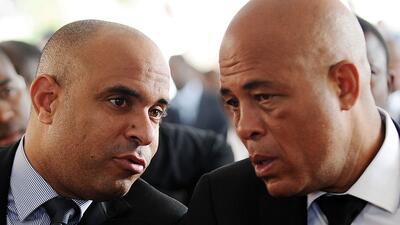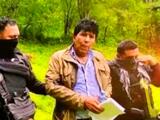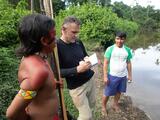U.S. and Canada turn to sanctions against Haitian politicians and businessmen accused of ties to gangs

In a new strategy to try and free Haiti from the grip of politically-fueled gang violence the United States and Canada are turning to an economic weapon that has rarely been brought to bear on the Caribbean island: sanctions.
In the last six weeks, the U.S. has sanctioned four Haitians, including the president of the Senate, while Canada has sanctioned 11 Haitians, including the former president, Michel Martelly, two former prime ministers and some of the country’s high-profile members of the economic elite. The United States appears poised to take the rare step of sanctioning Michel Martelly and prime minister Laurent Lamothe, who both live in Miami and are married to U.S. citizens.
The sanctions targets are accused of various forms of corruption, including links to armed gangs and drug traffickers in a vicious power struggle for control of one of the poorest country in the hemisphere. However, neither Canada nor the United States have so far presented evidence to back up the allegations contained in the sanctions announcements.
While many Haitians celebrated the sanctioning of some widely disliked politicians and businessmen long suspected of corruption, others have questioned the selective nature of the targeting and lack of transparency.
“As gangs and their enablers continue to terrorize the population, Canada will continue to put pressure on them to restore order in Haiti,” tweeted Melanie Joly, Canada’s foreign minister when the sanctions against Martelly and Lamothe were announced on November 20.
In response, Brian Nichols, the Assistant Secretary for Western Hemisphere Affairs at the U.S. Department of State, tweeted his warm support for Canada’s action “for imposing costs on individuals who instigate violence and unrest in Haiti. […] We will continue to support these efforts.”
Decades of corruption in Haiti
Despite rampant political corruption and instability in Haiti for decades, the United States has rarely used sanctions as an instrument of influence there, partly out of fear that it might cause even further economic hardship and turn local elites against the United States.
But, that calculation has shifted in recent months as kidnapping, rape and murder has spiraled out of control, turning the Caribbean country into an unlivable hell.
“It’s a huge step. The international community never sanctioned the elites in Haiti before,” said Diego Da Rin, a consultant with the International Crisis Group which published a report on Haiti last week urging international action to tackle the gang violence, cholera and hunger. “But it’s not enough,” added Da Rin. While the link between Haiti’s gangs and the political and business elites is well known, the gangs have grown so large they now operate more autonomously, he warned. “Before they were mercenaries. But they have been multiplying their sources of income. This is now an industry,” said Da Win.
On top of sanctions, Da Rin and others say Haiti urgently needs international help to stamp out corruption through major judicial reform and the restoration of democratic governance.
"The message that the sanctions send is that the international community is not ready to accept the current culture of impunity of Haitian society,” the highly respected rector of Quisqueya university in Haiti, Jacky Lumarque, told French radio TF1.
US and Canada trying to negotiate a political solution to restore democracy
The sanctions come as US and Canadian officials are trying to broker a political agreement between Haiti’s government and opposition to create a transitional government and pave the way for long overdue elections after the assassination of president Jovenel Moise in July 2021.
The US is working with a professional mediation company, Inter Mediate, led by Jonathan Powell, the former chief of staff to British prime minister, Tony Blair, according to several sources familiar with the mediation effort.
The U.S. State Department declined to confirm details of any “interlocutor […] with whom we are engaging out of consideration for their safety – and the safety of those they work with.”
Gang violence, cholera, hunger and an unpopular and unconstitutional government have turned Haiti’s plight into one of the most complex emergencies facing the Western Hemisphere. Haiti’s political instability has resulted in several foreign-military interventions over the decades, including half a dozen United Nations missions since the fall of the Duvalier dictatorship in the 1980s. Haiti has been without a president since Moise’s assassination and elections that were due to be held last February have yet to be scheduled.
The Haitian government has requested foreign military intervention, saying its small and ill-equipped police force is outgunned by an estimated 200 heavily armed gangs. The US and Canada have discussed sending troops or an international police force, but neither country has shown a willingness to take the lead in what many consider a risky venture.
Why have the US and Canada waited so long to sanction Haitian elites?
Critics say the US and Canada waited too long to wield the threat of sanctions, due to fears of causing even greater chaos. With information about alleged perpetrators of crimes and their links to high level Haitian officials well known to US officials, "one has to wonder why these tools for greater accountability in Haiti are only being applied recently,” said Susan Page, a former US ambassador who served as United Nations Special representative in Haiti. “It’s time to hold to account those responsible for the horror that is Haiti today,” Page added.
Biden administration officials have accused Haiti’s political and business elite of arming and paying gangs to target their enemies and create chaos to protect their interests, resulting in daily killings and kidnapping as well as the slaughters of innocents.
The sanctions bar them from traveling to the US or Canada, while also freezing their assets in those countries. Most of those sanctioned are politicians and businessmen living in Haiti, some with assets abroad. For example, one of the Senators sanctions by both Canada and the US, Rony Célestin, is the owner of a $4.25 million luxury villa on the outskirts of Montreal, Canada, and has long been suspected on illicit activity.
Célestin and another Senator, Richard Fourcand, are accused of “abusing their power to further drug trafficking activities across the region,” according to Brian E. Nelson, the US under-secretary of the Treasury for terrorism and financial intelligence.
The Treasury Department’s Office of Foreign Assets Control said Célestin abused his political position to orchestrate the importation of drugs from Venezuela into Haiti, as well as the export of drugs to the United States and The Bahamas. Treasury claims Fourcand uses his own aircraft to transport drugs through southern Haiti, while also using his political clout to install persons in government positions who would help to facilitate his drug trafficking activities.”
Fourcand and Célestin could not be reached for comment.
Haiti’s government has not commented publicly, though officials have privately expressed their shock and have asked Canada and the US for detailed justifications of the sanctions.
Michel Martelly and the Bald Headed party
The political party founded by Martelly, the Haitian Tèt Kale Party, (PTHK), meaning the Party of the Bald Heads in the Haitian Creole language, has long been accused of corruption, from stealing public funds and ties to drug trafficking and gang killings. Martelly is a popular singer who performed under the stage name ‘Sweet Micky’ before becoming president in 2011. One of his songs, ‘Legal Bandit’, personified his carefree style of government, his critics say.
Some say governments should make the evidence public or charge the sanctioned individuals with crimes.
“When impunity is the norm, I can understand the value of naming and shaming. But if there is evidence of criminal activity, why not bring charges? Why not turn the evidence over to prosecutors in Haiti?” said Jake Johnston, a Haiti expert at the Center for Economic and Policy Research (CEPR) in Washington.
How sanctions impact immigration status
For sanctions to be imposed a targeted person does not have to have been convicted of a crime. Instead, the individual can simply be suspected of criminal activity by US intelligence agencies.
However, U.S. officials concede that targeting individuals who live in the United States is harder as their immigration status gives them a degree of legal protection. Martelly is a legal permanent resident married to a US citizen, according to his attorney, while Lamothe told Univision he is in the process of applying for residency. In Martelly’s case, if he is sanctioned he could be denied re-entry to the United States after traveling abroad, according to Univision’s immigration analyst Ezequiel Hernandez. “His residency could also be rescinded if he lied about his activities and he could be put in deportation proceedings,” he said.
He could also face problems renewing his residency, or if he seeks citizenship, even if he is not formally accused of a crime. “He could be denied on the grounds of bad moral character or if it is deemed to be not in the US national interest,” he added.
Lamothe faces even greater risk of deportation if he is sanctioned due to his temporary immigration status.
But Martelly and Lamothe could still fight sanctions in court. Lamothe has already called on Canada to show what evidence it has, saying he plans to sue the government for defamation if it fails to present details.
The US and Canada are also looking to expand the sanctions with the help of the United Nations which adopted a U.S.-backed resolution to sanction Haitian gangs and their benefactors in October. The United Nations is currently assembling a team of investigators to targets Haitians linked to gangs.
While the sanctions send a strong message much will depend on how they are enforced, and to what end, experts say. “Is it to marginalize Martelly and ensure he doesn’t run in a future presidential election?” asked Page. Or would the US government use the sanctions “to demand certain reforms in Haiti by those currently in power,” she added.
"It's a complete fabrication," says Haitian former prime minister
Lamothe has strongly denied any links to criminal activity, noting that while he was prime minister Haiti’s crime rate was low. “It’s a complete fabrication. I’ve never in my life had any contact with gangs, or supported or cordoned their actions,” he told Univision, adding that he has not set foot in Haiti since 2020 and has no business interests there.
In a statement, Canada’s Global Affairs ministry told Univision that it is “judicious” in its approach to imposing sanctions and was ready to impose further sanctions “on those who will continue to support violence and instability.”
Asked about the status of Martelly and Lamothe, the U.S. State Department said, “we do not preview sanctions or visa restrictions […] and will continue to take appropriate action as necessary.”
But using sanctions doesn’t mean intervention is no longer an option, official say.
"We haven't taken anything off the table, but with 30 years of experience in Haiti, we know very well that there are enormous challenges when it comes to any intervention," Canada’s prime minister, Justin Trudeau, told an end of year press conference.
"It's clear that our approach must change this time, and that's why (there are) the sanctions we've placed," he added.




